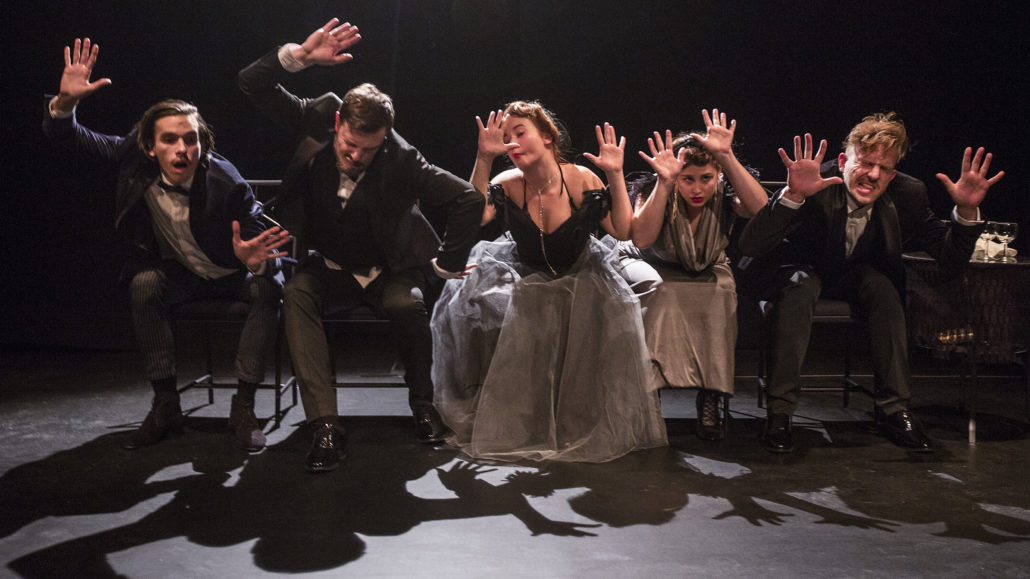Blaho Uhlár: Our feudal-etatist nature does not allow us even to comprehend freedom

Blaho Uhlár, photo: Ctibor Bachratý
For thirty years, director Blaho Uhlár has fought for the theatre, for art, for his ensemble, as well as for his own place in Slovak culture. His struggle has been marked by periods of successes and failures – in theatre, culture, society, and personal life. Uhlár’s authorial approach to theatre direction has fundamentally changed the shape of contemporary independent theatre.
Stoka has celebrated its thirtieth anniversary. How did you celebrate, given the pandemic situation?
I haven’t celebrated the anniversary yet. But I keep asking myself if I even have the right to celebrate it, because during the thirty years I celebrated almost every day. I don’t know if I can manage such a celebration mentally. That’s what I fear. But I’ll try.
What do those thirty years evoke when you think back? Many think you are a legend.
It’s been thirty years of an anxious and meaningless struggle with government institutions; a desperate effort to push through the importance of personal responsibility also in cultural matters, the struggle of an individual against the system with an evidently ineffective result. In art, there have been quite a few losses, but also many victories, but in the social and political arena, it’s been one defeat after another. It’s better to be a legend than a total failure. The question is, in what kind of society can someone who’s a total failure become a legend? I can console myself by such statements as the one allegedly made by Ján Jaborník some time ago: “Uhlár’s seed can be felt in the whole of Slovak theatre“. I like to think he did not mean it biologically. So it seems my reform might have influenced others as well. At my entrance test to the Academy of Performing Arts in 1969, when I said that I wanted to bring something new into Slovak theatre, I had no idea whether I was going to do it. Now it appears my post-pubescent dream may have just come true. Today, however, that is quite a paradox because my approach is never to plan anything in theatre. I always wait on the Lord.
So you’ve always believed in God?
I don’t mention God because I would believe in him – I guess I rather don’t – but because I’m aware of the immense amount of irrationality in our world. Some people say that we only make about four percent of our decisions rationally. I don’t know about that, but maybe the violently applied rationalization of theatre art during my studies made me feel disgust about rationality in art as such. Sometimes even actors were evaluated way more by how they were able to present “concepts” than by their actual acting. Some time ago, Peter Scherhaufer translated Sergei M. Eisenstein’s theatre notebooks. I read the notebooks, but they were just a desperate effort to turn theatre art into science and codify its principles. Despite their apparent wisdom, the texts gave me nothing and I wanted to have nothing with them. I’ve always wanted to make art according to my principles. And I guess the author himself had very little benefit from it all as well because the art he made afterwards never attracted much attention. Later on, I had a similarly problematic experience with another genius of Russian theatre – Konstantin Stanislavski. His need to rationalize human behaviour and codify it somewhat seems to have been the result of his mental disorder. It might just as well be the case that he was a psychopath who had no emotions. He could see that something like emotions existed, but he could not comprehend them. That is why he obsessively sought the help of psychologists – he wanted to find out about the essence of human emotions. Of course, he was doomed to fail.
You’ve been saying that the state should not interfere with culture.
The state should protect and support culture, not make it. Because when the government, regions or cities establish their theatres, they are, in fact, making culture. They select and appoint their people to positions in theatre institutions. That way, they petrify what are often artistically dead entities and transform them into social institutions.
I may use a slightly obvious term, but don’t you feel like a victim of this kind of system?
What is the system? I don’t know if I can blame it on the system. Maybe. But it is also a kind of Slovak curse. These days, the whole country is raving about our alpine skier, Petra Vlhová, but at the same time, we are learning that she does not owe her success to the support of the state, but rather to individuals.

Stoka tváre, photo: Ctibor Bachratý
What is Slovak theatre like now, thirty years after Stoka’s foundation?
I don’t feel entitled to talk about it universally because I don’t really follow any theatre other than my own. I feel ashamed for it, but it’s true. But because I know that Stoka is pinching pennies, every time I see that our foremost theatre is also just scraping by, I think it must be really bad. There is a shitload of independent theatres today – which should please me, really – but there are so many dependent theatres, too, and many new ones are being established. They get new spaces and also funding, so there is an unfair “business” environment from the start. Besides, it really pisses me off when some no-name theatre association receives a much higher subsidy than Stoka does. But it’s just like someone wrote about me at some point in the previous millennium: “Everyone knows that when Uhlár shows up, we will all learn something unpleasant, something we would prefer not to know, not to hear. And once we know it, we don’t want to know.” So… well, so much for that.
Would you say that there is any solidarity in Slovak theatre? When the Stoka building was being torn down, the reactions of the artistic community were half-hearted, and you witnessed the same disinterest just recently. It took a long time for you to find a space.
The social environment here is strongly tuned against the existence of independent theatres – actually against anything truly independent. Our feudal-etatist nature does not allow us even to comprehend freedom, let alone support it. At some point, I just stopped looking for a new space, I resigned because I knew it made no sense anyway. I just kept doing individual projects I rehearsed back then in my apartment in the old Cvernovka building. The apartment was pretty big, big enough to serve as a rehearsal space. We premiered a few times and even performed in other places.
Is Stoka political theatre? Or, in other words, is it an instrument for presenting Blaho Uhlár’s political and social attitude?
I have to admit, I tried to smuggle political issues into the productions before the regime change in 1989. But I don’t think I was doing political theatre. In a society where individual freedom was repressed, I tried to highlight it as a fact. Metaphorically and figuratively. After 1989, I no longer felt this need. So, if someone thinks my work is political, fine, but it’s certainly not my intention. It’s rather the consequence of the fact that the citizen, the individual, is still in the clutches of etatism, though in a different way.
Do you think that theatre, or art in general, is powerful enough to change the society?
Not society, but they say theatre can change an individual. I’ve realized, however, that we did change the way of Slovak theatremakers’ thinking, perhaps the thinking of the whole society. In the 1990s, it was generally unthinkable to start a professional theatre without having the state formally establish it. Four years before the foundation of Stoka, when I said I wanted to do a theatre production without a script, people thought I was mad because they considered it absolutely impossible. When we started our theatre and kept going, many believed it made no sense, or that it was just a passing extravagance. Today nobody questions the establishment of new theatre companies, on the contrary, everyone thinks it’s normal. Similarly, no one is surprised when a production is created without using a script written in advance. So I guess, some things can be changed, after all.
Anna Grusková’s documentary Life for Theatre symbolically accuses the Slovak society for not creating conditions for independent theatre and not fostering Blaho Uhlár’s theatrical dream. Is it worth staking your life on art?
There are people who have made a profit doing independent theatre. But that’s not my case. Even if I had staked my life on something other than theatre, I would have still ended up as a failure.
Why do you think that?
My capacity for planning is… imperfect to say the least. I like money – but not enough to be able to make it. I prefer to give it away. But that’s not how you build an empire.

Postfaktotum, photo: Ctibor Bachratý
Blaho Uhlár
Studied theatre direction at the Academy of Performing Arts in Bratislava. In 1974, he started working for the Theatre for Children and Youth in Trnava. In 1986, he took his first job as a director for the amateur theatre company called Disk, and in 1988 the Ukrainian National Theatre in Prešov (today called the Alexandr Duchnovič Theatre). In January 1991, together with Miloš Karásek, he established the independent cult theatre Stoka. By the time Stoka’s building on Pribinova street in Bratislava was demolished in 2006, all of the original members of the ensemble had left the theatre. At present, Stoka has a new ensemble which still applies the creative principles of collective collaboration and fixed improvisations pioneered by Uhlár. His idiosyncratic artistic approach makes him one of the most prominent personalities of experimental and avant-garde theatre of the 1990s.
Interviewer: Dáša Čiripová, theatrologist
Translation into English: Ivan Lacko
The interview was shortened. Its original version was published in the Slovak magazine kød – konkrétne o divadle 4/2021.


